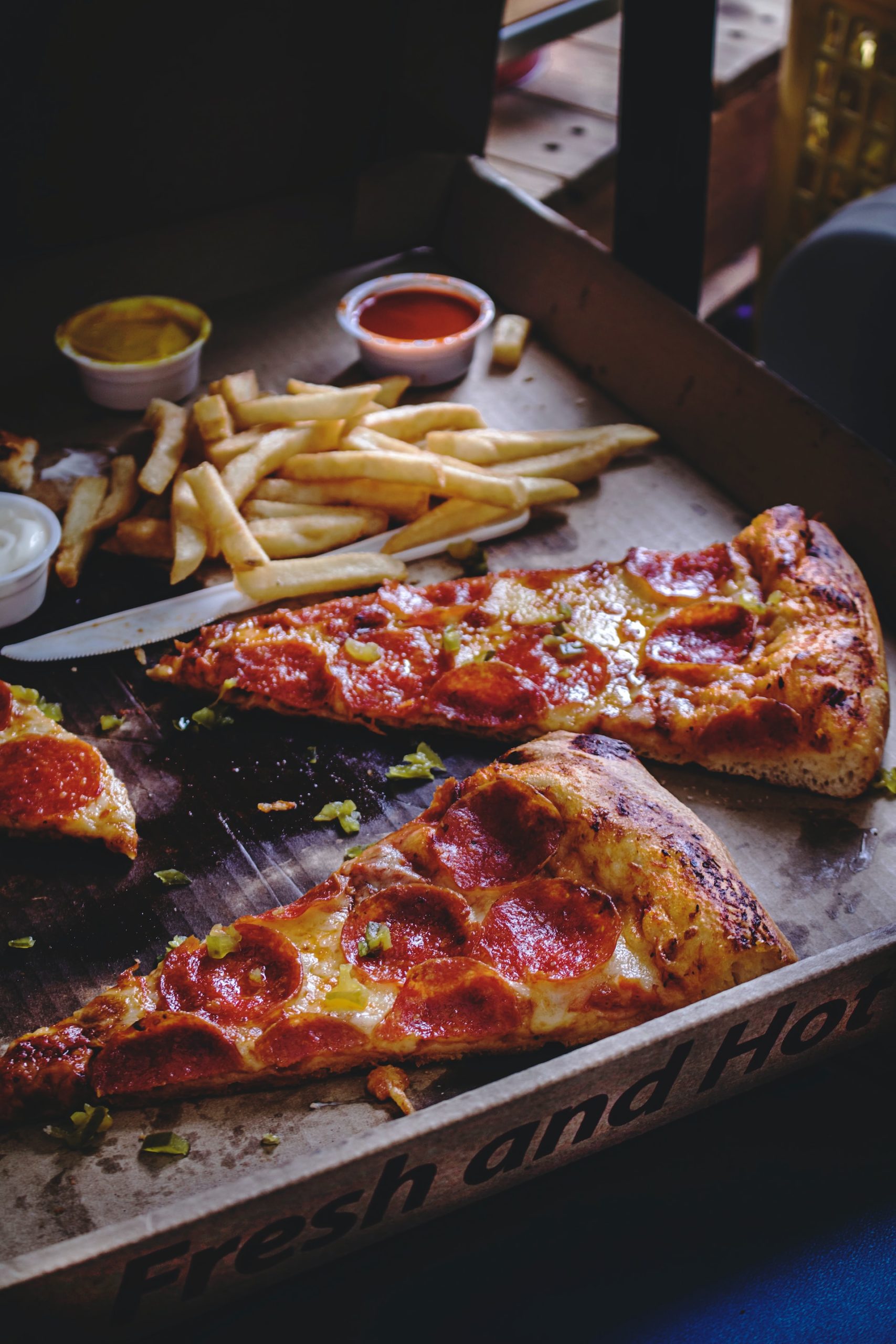Have you ever caught yourself eating a bag of your favorite sweet or salty snack only to realize you ate way more than you intended to? I think many of us can relate to this unfortunate experience. Consequently, this is often quickly followed by a rush of self-directed negative emotions: frustration, guilt, regret, and even disgust. Then the next day, next week, or next month we find ourselves repeating the cycle.
What is going on here and how can we break the cycle? The above scenario describes a situation often associated with emotion-based eating. Research shows that 35-50% of people report engaging in stress-related eating (Hill, et al., 2022; Adam & Epel, 2007).
Eating to cope.
Overeating is an all-too-common unhealthy coping strategy. Coping strategies can be anything that soothes us when  we are in distress. This distress could be low-grade anxiety or feeling overwhelmed. Eating in response to stress is often related to avoiding or numbing what we are feeling and/or experiencing.
we are in distress. This distress could be low-grade anxiety or feeling overwhelmed. Eating in response to stress is often related to avoiding or numbing what we are feeling and/or experiencing.
Unhealthy coping skills to numb and avoid could include drinking, zoning out, binge-watching a show for hours, or overeating/eating when you are not hungry. Eating to cope with stress is an avoidance tool that narrows our field of thinking and vision, so that we are ignoring the environment around us, including our problems and feelings. (Note: this article is not about eating disorders such as binge-eating disorder, bulimia nervosa, etc.)
Not all coping strategies, are helpful coping strategies, even if they soothe you or cause momentary relief. Many of us have never learned healthy coping strategies and have fallen into negative habits of coping, such as eating when stressed. We may need to intentionally develop and/or re-learn healthy coping strategies that work well for each of us. Creating new, healthy coping strategies takes work.
When we have a strategy for coping that we have used for a long time, there is a very strong neuropathway in our brain that creates a connection between stress and that “go to” coping strategy. In this case, when a person who typically eats to temporarily soothe themselves experiences distress. the connection will become stronger and stronger in their brain. Moreover, it often becomes an automatic behavior when faced with more stressors.
 Developing positive coping strategies is pivotal to being able to manage stress in a healthy way. Healthy coping strategies vary from one individual to another, but here are some that may be worth exploring to see if they could work for you:
Developing positive coping strategies is pivotal to being able to manage stress in a healthy way. Healthy coping strategies vary from one individual to another, but here are some that may be worth exploring to see if they could work for you:
- Standing outside for a few moments with your shoes off (a “grounding” technique).
- Deep breathing.
- Visualization.
- Taking a shower or bath.
- Reading.
- Coloring/painting/drawing.
- Journaling.
- Working on a puzzle.
- Playing a musical instrument.
- Splashing cold water on your face.
- Making a hot cup of tea in your favorite mug.
- Stretching or yoga.
- Gardening.
- Listening to music.
- Knitting.
- Walking the dog.
There are an endless number of healthy coping strategies. It’s important to develop a few go-to strategies that work for you that you can use when you are stressed. Have fun with it! Try out some of these coping strategies and see what works for you!
Stress: Unhealthy vs. healthy food consumption.
Take a moment to pause and reflect upon the last few times you were stressed. Did you find yourself reaching out more often for unhealthy foods that day? If so, you may be struggling with emotional or stress-related eating.
The stress-food relationship is a complex one and there are many theories formed to help explain it. However, the stress-food relationship continues to be uniquely individual. Some people decrease their food intake in times of stress while others increase their food intake.
One interesting relationship consistency that was found between stress and eating was the type of food people reached for. Those who engage in emotionally-based eating increase their intake of highly-palatably and unhealthy foods. Salty, fatty, and sweet foods tend to be the consistent culprits. The reverse is also true. Those who increase eating when stressed also decrease the amount of healthy, nutrient-rich foods they consume.
 One practical strategy to preventatively combat this is to limit easy-to-access unhealthy foods in the household and keep pre-prepped or convenient-to-grab healthy snacks on hand such as nuts or pre-cut vegetables and hummus. Another strategy the Mayo Clinic (2022) suggests is to not go shopping when you are experiencing intensely negative emotions. Remember that all emotions pass.
One practical strategy to preventatively combat this is to limit easy-to-access unhealthy foods in the household and keep pre-prepped or convenient-to-grab healthy snacks on hand such as nuts or pre-cut vegetables and hummus. Another strategy the Mayo Clinic (2022) suggests is to not go shopping when you are experiencing intensely negative emotions. Remember that all emotions pass.
Just like emotions have a beginning, they also have an end. Practice a healthy coping strategy, make a grocery list you stick to, and wait until the intensity of emotions levels out a bit before heading to the grocery store or fast-food establishment. Set your home environment up in a way that will give you the best chance of success when it comes to making positive eating choices in the face of stress.
The biology of the stress/threat response.
Mental health and physical health are highly interrelated. We cannot talk about mental health without considering its somatic effects, nor should we neglect the mental component of our physical health. Thus, you may not be surprised to hear that when we are stressed, it is not merely a “psychological” problem. There is also a strong physical component.
The HPA axis, which is heavily involved in the stress response, connects the pituitary gland and hypothalamus (located in the brain), with the adrenal glands (located just above the kidneys). These somatic connections and interactions are why things like appetite and digestion are impacted when we experience stress.
An interesting component is that appetite decreases in the face of a threat, because of the release of chemicals like adrenaline. Our body shuts down all unnecessary systems that are not required for immediate survival as it prepares to deal with the perceived threat. How does this relate to stress eating then? If our appetite ceases during times of perceived threat, why do so many of us do the opposite when we are stressed?
This has to do with a part of the brain that is called the reward center and is a highly researched and very relevant theory to help explain the frustrating cycle of stress eating.
Stress, eating, and the reward system.
 The reward theory of stress eating posits that there are certain parts of the brain (the parts that make up the reward center) that become more sensitive due to a change in chemicals released in the body naturally when we experience stress. This includes the well-known stress-related chemical called cortisol.
The reward theory of stress eating posits that there are certain parts of the brain (the parts that make up the reward center) that become more sensitive due to a change in chemicals released in the body naturally when we experience stress. This includes the well-known stress-related chemical called cortisol.
When the reward center becomes activated, it can increase a drive to eat high-energy, low-nutrient, palatable food (unhealthy food) (Hill, et al., 2022; Adam & Epel, 2007) and simultaneously increase the release of the dopamine neurotransmitter. Dopamine is the main neuropathway involved in receiving and experiencing rewarding stimuli.
As a result, a feedback loop can be created where unhealthy foods are now associated in your brain as being rewarding when in distress. This can lead to us unconsciously (or consciously) being motivated to access these highly-plateable, unhealthy foods when we are in stressful situations in the future (Hill, et al., 2022).
Not only do those who engage in stress eating develop a positive feedback loop related to stress and consuming unhealthy foods, another unhelpful cycle, the guilt-laden feedback loop, often develops as well.
The guilt-related self-talk associated with the pattern of eating more unhealthy food than one necessary can lead to more negative emotions which can again lead to emotional, or stress-related eating. These patterns can be complex and often cause people to feel powerless and stuck.
Counseling for stress-eating.
If you are finding yourself stuck in the feedback loop of stress-eating and don’t know where to start, counseling could be a positive next step for you. A trained mental health counselor can help with insight into where you are getting stuck in the stress-eating feedback loop. They can also help you work to develop positive coping strategies, as well as explore some of the underlying causes of stress and stress-response patterns in your life as a whole.
References:
Adam, T. & Epel, E. (2007). Stress, eating, and the reward system. Psychology & Behavior, 91, 449-458. DOI: 10.1016/j.physbeh.2007.04.011.
Hill, D., Connor, M., Clancy, F., Moss, R., Wilding, S., Bristow, M., & O’Connor, D. (2022). Stress and eating behaviours in healthy adults: A systematic review and meta-analysis. Health Psychology Review, 16 (2), 280-304. DOI: 10.1080/17437199.2021.1923406.
Mayo Clinic. (2022, December 2). Tips to stop emotional eating. Mayo Clinic. Retrieved December 29, 2022, from https://www.mayoclinic.org/healthy-lifestyle/weight-loss/in-depth/weight-loss/art-20047342
“Overwhelmed”, Courtesy of Nik Shuliahin, Unsplash.com, CC0 License; “Pizza and Fries”, Courtesy of Eiliv Aceron, Unsplash.com, CC0 License; “Walking on a Log”, Courtesy of Jon Flobrant, Unsplash.com, CC0 License; “Listening to Tunes”, Courtesy of Jackson Simmer, Unsplash.com, CC0 License





